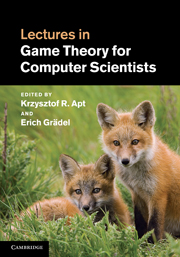Book contents
- Frontmatter
- Contents
- List of contributors
- Preface
- 1 A Primer on Strategic Games
- 2 Infinite Games and Automata Theory
- 3 Algorithms for Solving Parity Games
- 4 Back and Forth Between Logic and Games
- 5 Turn-Based Stochastic Games
- 6 Games with Imperfect Information: Theory and Algorithms
- 7 Graph Searching Games
- 8 Beyond Nash Equilibrium: Solution Concepts for the 21st Century
- Index
7 - Graph Searching Games
Published online by Cambridge University Press: 01 June 2011
- Frontmatter
- Contents
- List of contributors
- Preface
- 1 A Primer on Strategic Games
- 2 Infinite Games and Automata Theory
- 3 Algorithms for Solving Parity Games
- 4 Back and Forth Between Logic and Games
- 5 Turn-Based Stochastic Games
- 6 Games with Imperfect Information: Theory and Algorithms
- 7 Graph Searching Games
- 8 Beyond Nash Equilibrium: Solution Concepts for the 21st Century
- Index
Summary
Abstract
This chapter provides an introduction to graph searching games, a form of one- or two-player games on graphs that have been studied intensively in algorithmic graph theory. The unifying idea of graph searching games is that a number of searchers wants to find a fugitive on an arena defined by a graph or hypergraph. Depending on the precise definition of moves allowed for the searchers and the fugitive and on the type of graph the game is played on, this yields a huge variety of graph searching games.
The objective of this chapter is to introduce and motivate the main concepts studied in graph searching and to demonstrate some of the central ideas developed in this area.
Introduction
Graph searching games are a form of two-player games where one player, the Searcher or Cop, tries to catch a Fugitive or Robber. The study of graph searching games dates back to the dawn of mankind: running after one another or after an animal has been one of the earliest activities of mankind and surely our hunter-gatherer ancestors thought about ways of optimising their search strategies to maximise their success.
- Type
- Chapter
- Information
- Lectures in Game Theory for Computer Scientists , pp. 213 - 263Publisher: Cambridge University PressPrint publication year: 2011
- 2
- Cited by

